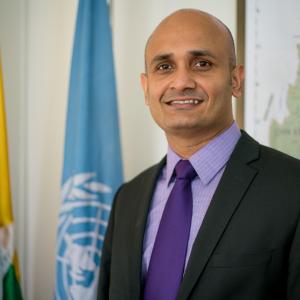Thank you for the opportunity to join you from Yangon today to draw your gaze to the unfolding humanitarian catastrophe in Myanmar after Cyclone Mocha where we are now responding to an emergency within an emergency.
Since I last spoke with you a week ago, our teams have been moving around the impact zone and clearer picture has emerged of the damage and suffering caused by this disaster.
I am sorry to say that this picture is much worse than expected.
Barely a building has escaped damage in areas of highest impact along the coast between Sittwe and Rathedaung in Rakhine state.
Houses, camps, schools, health clinics and bridges have been destroyed by the cyclone which recorded wind speeds of more than 250kmph as it approached the Rakhine coast, making it one of the strongest cyclones ever to hit the country.
The disaster has left hundreds of thousands of already vulnerable people without a roof over their heads as the monsoon looms.
The humanitarian community is now in a race against time to provide people with safe shelter in all affected communities and prevent the spread of water-borne disease.
One IDP from the Sittwe camps told colleagues in Rakhine that his shelter was destroyed while his family took refuge at an evacuation site at the height of the storm. He reported that those who stayed had faced a horrible experience as the camp was submerged in water from storm surge. He told us that the IDPs need medical care, clean water and food, as well as support to rebuild their shelters.
This cyclone has hit one of country’s poorest areas, where there were already high pre-existing needs, leaving these communities extremely vulnerable.
Interruptions to livelihoods including agriculture and fishing are also going to add to the distress of many people.
Conflict-affected parts of the country in the Northwest and Northeast have also been heavily affected by flooding and need urgent support.
Humanitarian partners with access to the affected populations have geared up to provide critical and lifesaving assistance.
Hundreds of humanitarian personnel are on the ground in Rakhine and are already distributing food aid, shelter support, water and hygiene items wherever they have access, while mobile health teams have been supporting people on the ground.
Thousands of people have already received support and we are hoping to soon receive the greenlight for a two-week distribution plan for support that is ready to be provided across all affected communities in Rakhine and Chin.
We are also working to bring additional supplies into the country for urgent distribution in the high impact zone and I hope to have more to say on this in the coming days.
Given the scale of the disaster, the humanitarian community in Myanmar is today launching a $333 million Flash Appeal to assist 1.6 million people affected by Cyclone Mocha and its aftermath.
The Flash Appeal requests an urgent injection of funds for activities to support vulnerable people in the highest impact zone across Rakhine, Chin, Magway, Sagaing and Kachin.
The Appeal includes a combination of $211 million in prioritized activities from the 2023 Myanmar Humanitarian Response Plan that are being pivoted or scaled-up to support the cyclone response in affected areas plus $122 million for new activities or support to half a million people newly affected by this disaster.
The 1.6 million people identified for support under this appeal include people who have lost their homes, people who lack access to health services and clean water, people who are food insecure or malnourished, displaced people in camps, stateless people, women, children and people with a disability – a group that is particularly at-risk during disasters.
Those affected are facing a long, miserable monsoon season if we cannot mobilize resources for the distribution of additional assistance.
The Emergency Relief Coordinator has kick-started the cyclone response with a $10m allocation from the Central Emergency Response Fund (CERF).
But much more is needed, and I urge the international community to dig deep in support of our response to this devastating crisis on top of a crisis.






